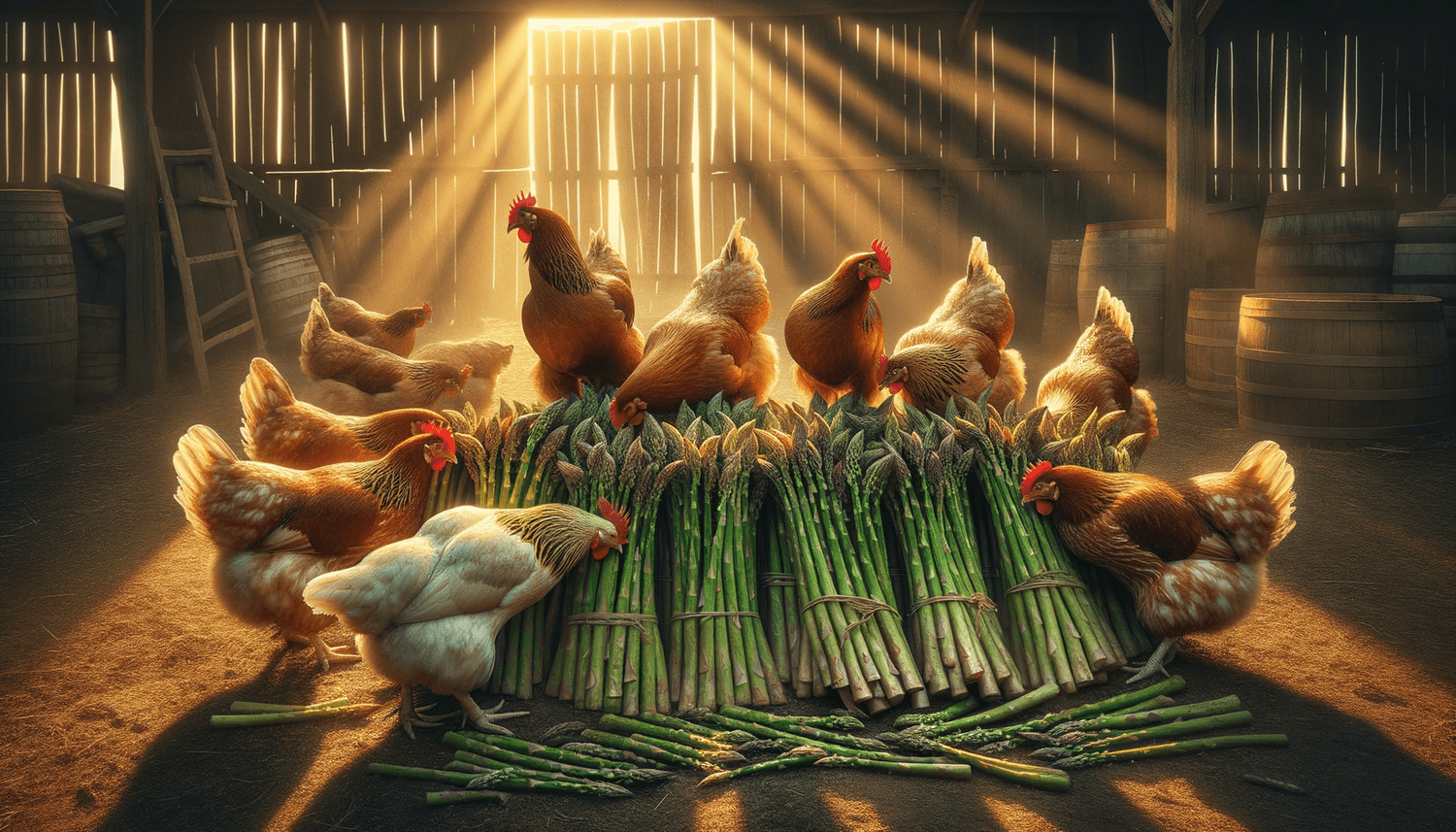Hey there, my fellow chicken enthusiasts! 🐔 Today, we’re diving into the world of greens with a fun question on everyone’s mind: Can chickens eat asparagus? After all, these feathered friends fill our lives with joy (and eggs), and we want to make sure we’re serving up only the best for our clucky comrades. So, fluff your feathers and get ready to explore the ins and outs of asparagus, delving into the importance of a balanced diet, the potential benefits and risks of this veggie, its nutritional value, and even how to prepare it for your flock. Let’s get cracking! 🥚
Can chickens eat asparagus?
Yes, chickens can eat asparagus, and it is safe for them. Asparagus contains various nutrients that can contribute to your flock’s overall health. However, moderation is key, as feeding them excessive amounts of asparagus could lead to digestive issues or an imbalance in their diet.
A balanced diet for happy chickens
Just like humans, chickens need a balanced diet to stay healthy and thrive. The cornerstone of a chicken’s nutrition is a high-quality chicken feed, which should constitute around 80-90% of their diet. This chicken feed typically contains the perfect mix of proteins, vitamins, minerals, and other essential nutrients to maintain their overall health and promote egg production.
The remaining 10-20% of a chicken’s diet can be made up of tasty treats like fruits and vegetables. This not only adds variety to their meals but also provides them with additional nutrients that may not be sufficiently present in commercial feed alone. When offering fruits and vegetables, remember the golden rule of moderation to ensure your chickens’ diet remains balanced and their bodies happy.
Nutritional value of asparagus for chickens.
Feeding asparagus to chickens does offer nutritional value, as this vegetable is packed with essential vitamins, minerals, and other nutrients. Asparagus is an excellent source of vitamins A, C, E, and K, which are vital for maintaining a chicken’s immune system, improving their vision, and supporting healthy feathers and skin. Additionally, this veggie is rich in folate and B vitamins, which are important for overall health and egg production.
Besides vitamins, asparagus provides chickens with essential minerals such as potassium, phosphorus, and magnesium. Potassium contributes to maintaining optimal nerve and muscle function, while phosphorus supports healthy bone development. Magnesium is essential for various body processes, such as enzyme function and energy production.
Furthermore, asparagus is a good source of hydration, as it contains a high percentage of water content, which can help keep your flock’s hydration levels in check. Overall, adding asparagus to your chickens’ repertoire of treats in moderation can supply them with important nutrients that contribute to their well-being and happiness.
Nutrition table of asparagus for chickens.
| Information | Description |
|---|---|
| Nutritional Value | Asparagus is rich in vitamins A, C, E, K, folate, and B vitamins, as well as minerals like potassium, phosphorus, and magnesium. |
| Suggested Serving Size | Feed asparagus in moderation as part of the 10-20% treats portion of a chicken’s balanced diet. |
| Safe Feeding Practices | Ensure that asparagus is fresh, free of pesticides, and cut into small, manageable pieces for your chickens. |
| Preparation | Rinse asparagus thoroughly, and remove any tough or woody ends before cutting into small pieces. |
| Potential Risks | Excessive amounts of asparagus can lead to digestive issues or an imbalance in a chicken’s diet. |
| Hydration | Asparagus has a high water content, which can contribute to keeping chickens hydrated. |
| Digestion | Asparagus can be easily digested by chickens, as long as it is served in small, manageable pieces. |
| Seasonal Availability | Asparagus is typically available in the spring, but it can be found year-round in some areas or as frozen produce. |
| Other Benefits | Asparagus provides a variety of nutrients that support a chicken’s immune system, vision, feather and skin health, and egg production. |
Alternatives to asparagus
If you’d like to add even more variety to your chicken’s diet, there are many other fruits and vegetables that make great treats in addition to asparagus. Spinach, kale, and other leafy greens are excellent sources of vitamins and minerals. You can also offer them fruits like berries, melons, or apples, making sure to remove any seeds or pits, as they can be harmful to chickens.
Potential hazards
While asparagus is a safe and nutritious treat for chickens, there are some fruits and vegetables to avoid. Never feed your chickens foods like avocado, chocolate, onions, or garlic. These can be toxic and harmful to your flock. Additionally, avoid giving them high-sugar or high-salt foods or anything containing caffeine, as these can also pose health risks.
Chicken-tender treats
Aside from fruits and vegetables, chickens enjoy a multitude of other tasty treats, such as insects and worms, which provide them with additional protein. Grains like cooked rice, pasta, or small amounts of cracked corn can also be fun and nourishing for your feathered friends. Always make sure the treats you offer are suitable for chickens and can be easily digested.
In conclusion, asparagus is a safe and nutritious addition to your chickens’ diet, as long as it’s fed in moderation. Keep in mind that a balanced diet, primarily consisting of high-quality chicken feed, is essential for your flock’s overall health and happiness. Providing a variety of fruits, vegetables, and other appropriate treats will keep your chickens content and well-nourished.

















